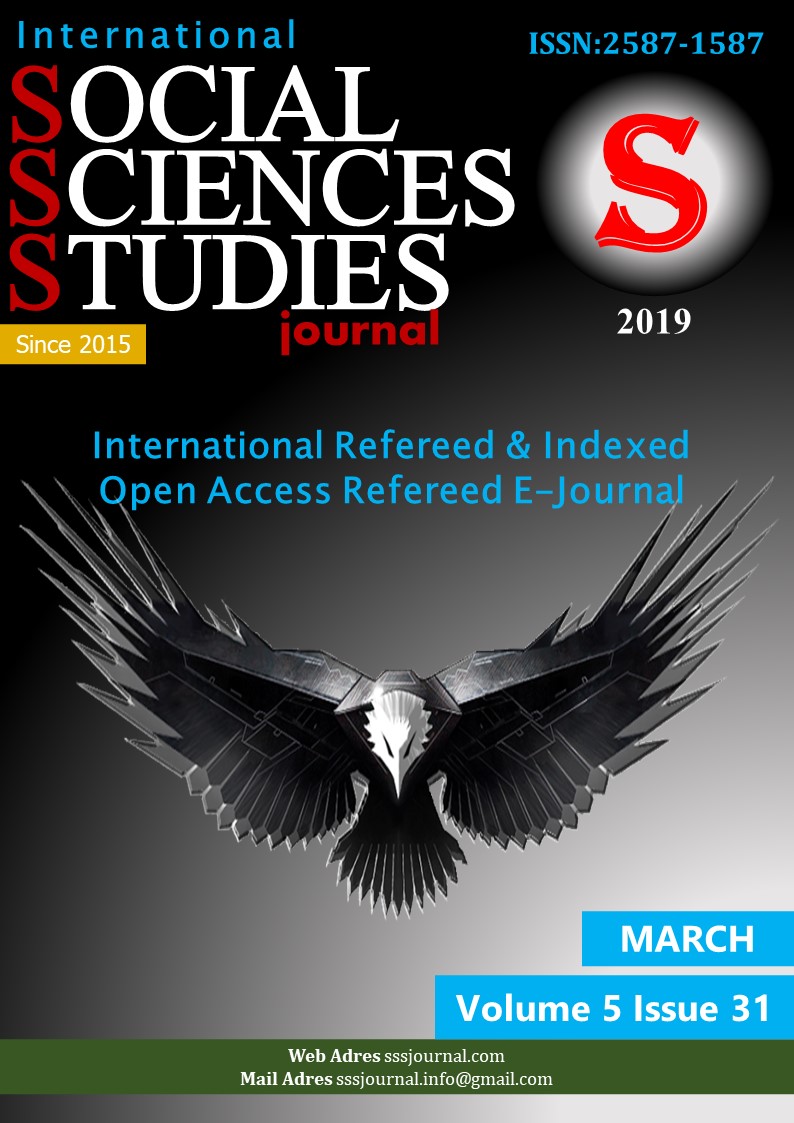Author :
Abstract
Bu çalışmanın amacı, genel kapsamıyla İslami Feminizmin ortaya çıkışını, amaçlarını, temsilcilerinin söylemlerini ortaya koyarak Türkiye’de ilk İslami Feminist olarak kabul edilen Konca Kuriş’in yaşamı ve söylemlerinin İslami Feminizmle kesiştiği noktaları tespit etmektir. Bu amaç kapsamında Konca Kuriş’in hayatı ve söylemleri üzerine odaklanılmıştır. İbadetin Türkçe yapılabileceği, kadınların regl dönemlerinde namaz kılıp oruç tutabileceği, Kur’an’da çarşafın olmadığı, Kur’an’da kadın ve erkeğe eşitlikçi yaklaşımın olduğu, kadınların da erkekler gibi cuma ve cenaze namazına katılabileceği, erkeklerle birlikte namaz kılabileceği yönündeki söylemlerinin İslami Feminizmin söylemleriyle kesişerek İslami Feminizmin ideolojisine denk düştüğü tespit görülmüştür.
Keywords
Abstract
The aim of this study is in general context to present the emergence of Islamic Feminism, its aims and the discourses of its representatives, and to determine the points where the life and discourses of Konca Kuris, considered as the first Islamic Feminist in Turkey, intersect with Islamic Feminism. Within the scope of this aim, Konca Kuriş's life and discourse has been focused on. In the manner that women can perform prayers during the periods of their menstrual periods, that there is no chador in the Qur'an, that there is an the equitable approach for women and men in the Qur'an, that women can attend Friday and the funeral prayers and perform prayers together with men; the discourses has been observed that they coincide with the ideology of Islamic Feminism and they are suitable for the ideology of Islamic Feminism.
Keywords
- Abou-Bakr, O. (2014). İslami Feminizm ve Bilginin Üretilmesi: Devrim sonrası Mısır'dan Manzaralar. Z.
- Abou-Bakr, O. (2014). İslami Feminizm ve Bilginin Üretilmesi: Devrim sonrası Mısır'dan Manzaralar. Z. Ali içinde, İslami Feminizmler (s. 146-166). İstanbul: İletişim Yayınları.
- Akyılmaz, Ö. (2015). Türkiye’deki Bloglarda İslamcı Feminist Yaklaşımla Yeni Bir Kadın Kimliğininİnşası (Reçel Blog Örneği). Yayımlanmış Yüksek Lisans Tezi. Gaziantep Üniversitesi, Sosyal Bilimler Enstitüsü, İletişim ve Toplumsal Dönüşüm Anabilim Dalı, Gaziantep.
- Anwar, Z. (2014). Dini Yasa Altındaki Malezya'da Kadın Hakları Müzakereleri. Z. Ali içinde, İslami Feminizmler (s. 127-146). İstanbul: İletişim Yayınları.
- Ayla, (2000). Konca Kuriş’in ardından. Pazartesi Dergisi, s. 6.
- Badran, M. (2009). Islamic Feminism: What's in a Name? M. Badran içinde, Feminism in Islam: Secular and Religious convergences , 242-252.
- Bedia, (2000). Konca Kuriş’in ardından. Pazartesi Dergisi, s. 6.
- Bilgin, V. (2003). Popüler Kültür ve Din: Dindarlığın Değişen Yüzü. Uludağ Üniversitesi İlahiyat Fakültesi, 193-214.
- Bell, Hooks. Feminizm Herkes İçindir. İst: Çitlembik Yay., 2000.
- Beşli,G.M.(2013).İslamcıFeminizm.https://www.academia.edu/16727489/%C4%B0slamc%C4%B1_Femi nizm.(Erişim: 24.01.2019).
- Eraslan, S. (2000). Konca’nın ölümü örtülü olup da 'ortada’ olan kadınlara bir gözdağı. Pazartesi Dergisi, s. 7.
- Güleçyüz, Y. (2000). Konca Kuriş Oyunun Bir Parçası. Pazartesi Dergisi, s. 7.
- Gürhan, Nazife (2011), “Kadın Bakış Açısıyla Kuran’ı Yeniden Okuma Denemesi- Amina Wedud-“,Kuran ve Kadın- e-Şarkiyat İlmi Araştırmalar Dergisi -www.e-sarkiyat.com- ISSN: 1308-9633 Sayı: VI, Kasım 2011.
- Gürhan, N. (2010). Toplumsal Cinsiyet ve "İslami Feminist" Söylem. Bilim, Ahlak Ve Sanat Bağlamında Çağdaş İslam Algıları, (s. 366383). Samsun.
- Hamidi, M. (2014). Avrupa'da Musluman Feminizm: "Metinsel Aktivizm" ve Ulus Aşırı Niteliği. Z. Ali icinde, İslami Feminizmler (s. 88-100). İstanbul: İletişim Yayınları.
- Hosseini, Z. M. (2004). The quest for gender justice Emerging Feminist Voices in Islam. Islam 21(36), 1-5.Hürriyet, (2000). İstediği gibi olmadı. http://www.hurriyet.com.tr/gundem/istedigi-gibi-olmadi-39128298 (Erişim: 26.01.2019).
- İmançer, Dilek. “Feminizm ve Yeni Yönelimleri”. Doğu Batı Düşünce Dergisi, Yeni Düşünce Hareketleri. Yıl: 5, Sayı: 19, 2002.
- Kuriş, Y. (2014). Konca Kuriş. Ot Dergisi.
- Kuriş, Y. (2018). Annem Konca Kuriş. https://www.youtube.com/watch?v=03ay_m1ZsLw (Erişim: 25.01.2019).
- London: One World Oxford.Darvishpour, M. (2003). “Islamic feminism”: Compromise or Challenge To Feminism? Iran bulletin- Middle East Forum, 55-58
- Mernissi, Fatıma, (2003), Kadınların İsyanı ve İslami Hafıza, Ankara: Epos Yayınları. Ölçer, A. N. (2000). Konca Kuriş’in ardından. Pazartesi Dergisi, 6.
- Şenlikoğlu, E. (2000). Feminizm açısından önemli adımlar atmıştır. Pazartesi Dergisi, s. 8.
- Tunç, H. (2018). İslamcı Feminizm: Kavramsal Bir Tartışma. Hatay Mustafa Kemal Üniversitesi İlahiyat Fakültesi Dergisi. 1, 2, 235-247.





